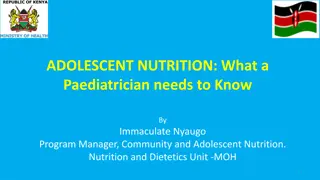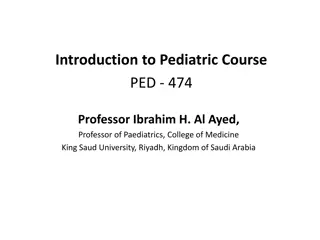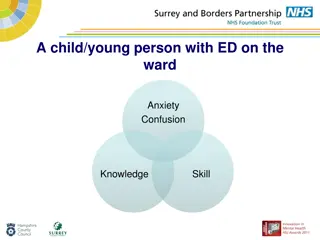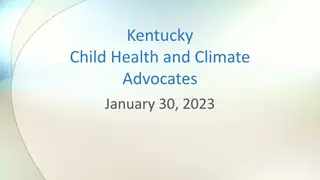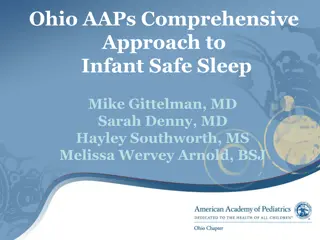Essential Nutrition Guidelines for Adolescents: What Pediatricians Should Know
Adolescents undergo significant physical changes that require specific nutritional needs. Pediatricians should be aware of the increased requirements for energy, proteins, and micronutrients during this crucial stage. Providing nutrition assessment, counseling, and adequate supplementation can help
0 views • 11 slides
Overview of Pediatric Course by Professor Ibrahim H. Al Ayed
Pediatrics, as taught by Professor Ibrahim H. Al Ayed at King Saud University, focuses on the health and medical care of infants, children, and adolescents. The course covers the definition, objectives, teaching methods, evaluation criteria, and key responsibilities of pediatricians. It also delves
0 views • 27 slides
Comprehensive Management Guidelines for Pediatric Eating Disorders
This comprehensive guide covers the management of children and young persons with eating disorders, focusing on anxiety, confusion, knowledge, and skill development. It emphasizes the partnership between pediatricians and psychiatrists, specific medical and nutritional aspects, adequate support, and
0 views • 29 slides
Kentucky Child Health and Climate Advocates Meeting Summary
Kentucky Child Health and Climate Advocates held a meeting to discuss the role of pediatricians in addressing climate change. The event focused on promoting education and readiness in communities regarding climate-related health issues. Recommendations included building coalitions and integrating cl
0 views • 11 slides
Understanding Loss of Consciousness and Sudden Cardiac Death in Children
Loss of consciousness, including syncope and sudden cardiac death, is a significant concern in pediatric patients. The epidemiology shows that approximately 25% of children experience at least one episode of loss of consciousness before the age of 19, with girls visiting pediatricians more than boys
0 views • 5 slides
Ohio AAP's Approach to Infant Safe Sleep Initiatives
Ohio AAP has implemented comprehensive safe sleep initiatives focusing on increasing pediatrician awareness, conducting injury prevention projects, and launching statewide campaigns. Their Quality Improvement Program has successfully assisted pediatricians in screening families for risks and address
0 views • 15 slides
